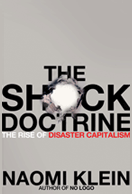The Shock Doctrine

Disaster Capitalism in Action: wall street
Chicago Factory Workers Win!
Michael Tarm, Associated Press, December 10, 2008
"Jubilant workers, cheering and chanting "Yes We Can," celebrated outside a Chicago factory after approving a $1.75 million agreement to end their six-day sit-in, a dispute that became a symbol of the plight of labor nationwide. Republic Windows & Doors, union leaders and Bank of America reached the deal Wednesday night.....
"Each former Republic employee will get eight weeks' salary, all accrued vacation pay and two months' paid health care, said U.S. Rep. Luis Gutierrez, who helped broker the deal. He said it works out to about $7,000 apiece."
Workers Occupying Chicago Factory Suffer as Bank of America Renegs on its $25 Billion Bailout Commitment to Extend Lending
Don Babwin, Associated Press, December 8, 2008
The nation's grim economy now has a rallying point: Employees at a window-and-door factory that went out of business have taken over the building in a siege that has come to symbolize the woes of the ordinary worker.
The Republic Windows and Doors factory closed abruptly last week after Bank of America canceled the company's financing. Since then, about 200 of the 240 laid-off workers have taken turns occupying the factory, declaring that they will not leave until getting assurances they will receive severance and accrued vacation pay....
Blagojevich on Monday ordered all state agencies to stop doing business with Bank of America to pressure the bank into using federal bailout money it received to help the laid-off workers. "We hope that this kind of leverage and pressure will encourage Bank of America to do the right thing for this business," Blagojevich said outside the plant. "Take some of that federal tax money that they've received and invest it by providing the necessary credit to this company so these workers can keep their jobs."
Democratic Sen. Dick Durbin of Illinois said he wanted to ask his fellow senators to remind banks that the bailout wasn't to be used for dividends and executive salaries. "They're for loans and credit to businesses just like Republic," he said.
See Also:
Sign the Jobs with Justice petition to support the workers occupying the Chicago factory & hold Bank of America accountable.
"How Fumbling the Bailout Led to the Chicago Sit In," by Ian Welsh for Firedoglake, December 8, 2008
Firms Receiving Bailout Funds Continue Multi-Million Dollar Sports Sponsorships
Justin Rood, ABC News, November 24, 2008
"AIG, Citibank and a number of other federally bailed-out financial institutions have no plans to cancel hundreds of millions of dollars in sports team sponsorships, even as they take billions in taxpayer support, ABC News has found....
"Struggling Citibank just sealed a multi-billion-dollar emergency "backstop" deal with the U.S. government. The financial behemoth, suffering with billions in bad mortgage-related assets on its books, recently shed 53,000 workers and saw its stock price lose over half its value. Yet it's in a 20-year contract to pay the New York Mets $400 million to name the team's new stadium 'Citi Field'....
"Citi isn't alone: Imploding insurance giant AIG is paying the British soccer team Manchester United $125 million for the privilege of having its logo appear on Man U's uniforms. That, despite the fact the firm is standing largely thanks to a $150 billion lifeline from the U.S. Treasury."
Treasury Department Snuck a Windfall Clause for Banks into the Bailout Bill
Amit R. Paley, Washington Post, November 10, 2008
"The financial world was fixated on Capitol Hill as Congress battled over the Bush administration's request for a $700 billion bailout of the banking industry. In the midst of this late-September drama, the Treasury Department issued a five-sentence notice that attracted almost no public attention.
"But corporate tax lawyers quickly realized the enormous implications of the document: Administration officials had just given American banks a windfall of as much as $140 billion.
"The sweeping change to two decades of tax policy escaped the notice of lawmakers for several days, as they remained consumed with the controversial bailout bill. When they found out, some legislators were furious. Some congressional staff members have privately concluded that the notice was illegal. But they have worried that saying so publicly could unravel several recent bank mergers made possible by the change and send the economy into an even deeper tailspin."
See Also:
Treasury to Review New Tax Break Plan, New York Times, November 19
Schumer Questions IRS Rule Aiding Wells-Wachovia, Reuters, October 30
Obscure Tax Breaks Increase Cost of Financial Rescue, Wall Street Journal, October 18
After Change in Tax Law, Wells Fargo Swoops In, Washington Post, October 4
Federal Reserve Refuses to Disclose Details of Loans Totalling $2 Trillion
Mark Pittman, Bob Ivry and Alison Fitzgerald, Bloomberg News, November 10, 2008
"The Federal Reserve is refusing to identify the recipients of almost $2 trillion of emergency loans from American taxpayers or the troubled assets the central bank is accepting as collateral.
"Fed Chairman Ben S. Bernanke and Treasury Secretary Henry Paulson said in September they would comply with congressional demands for transparency in a $700 billion bailout of the banking system. Two months later, as the Fed lends far more than that in separate rescue programs that didn't require approval by Congress, Americans have no idea where their money is going or what securities the banks are pledging in return....
"Bloomberg News has requested details of the Fed lending under the U.S. Freedom of Information Act and filed a federal lawsuit Nov. 7 seeking to force disclosure."
See Also:
Lawmakers, Investors Ask Fed for Lending Disclosure, Bloomberg News, November 13
Treasury Official Says Banking Consolidations Are a Goal of the Bailout
Mark Landler, New York Times, October 21, 2008
"In a step that could accelerate a shakeout of the nation's banks, the Treasury Department hopes to spur a new round of mergers by steering some of the money in its $250 billion rescue package to banks that are willing to buy weaker rivals, according to government officials.
"As the Treasury embarks on its unprecedented recapitalization, it is becoming clear that the government wants not only to stabilize the industry, but also to reshape it. Two senior officials said the selection criteria would include banks that need more capital to finance acquisitions.
"'Treasury doesn't want to prop up weak banks,' said an official who spoke on condition of anonymity, because of the sensitivity of the matter. 'One purpose of this plan is to drive consolidation.'"














